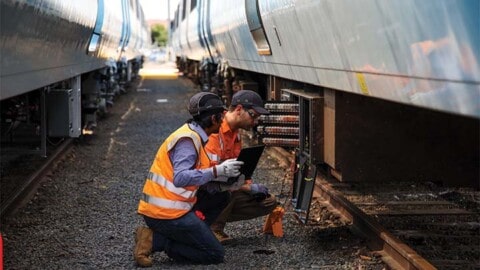by Leilani Frew, CEO, Infrastructure and Project Financing Agency (IPFA)
The provision of infrastructure in Australia faces challenges from vast distances, a population that is concentrated in sprawling cities, finite financial resources within our economy, competition between freight and commuter uses on many corridors, and citizens who expect quality outcomes that meet their needs and deliver on promised benefits.
These challenges make it all the more important that we are strategic around both what we invest in and how we invest. In particular, this more strategic focus on ‘what’ and ‘how’ requires the Australian infrastructure industry to continue its journey of evolution.
Strengthening the integration of the ‘what’

Leilani Frew.
The need for greater strategic planning has been a well accepted development over the last few years; the creation of Infrastructure Australia and the infrastructure bodies around the nation focused on the what, why and when, has been a critical development in our sector.
The recognition that infrastructure is no longer thought of as the end but as the means to enable services and deliver outcomes for citizens has underpinned business cases and procurements for projects currently being delivered.
The focus on placemaking and land use in recent times, particularly through City Deals, has created an environment where infrastructure planners embrace the challenge of developing future connectivity solutions for citizens that allow us to work, live and play in an integrated manner.
Strengthening the integration of the ‘how’
According to analysis of state, federal and territory budgets by Infrastructure Partnerships Australia, from 2018-2021 we will see around $170 billion in public infrastructure investment across all sectors.
This quantum of investment means now is the time to have a greater acknowledgement that it takes a village of equally capable partners with key roles to play in order to raise an infrastructure project.
Whether its private sector businesses of contractors, investors, financiers or operators, not-for-profit organisations, local councils, state governments or the Commonwealth Government, we all have a role to play in delivering infrastructure-enabled services for citizens.
As with our placemaking and connectivity solutions, we need to deliver these services in a more integrated way. As a sector, we must also ensure that we each have the right capability to deliver both as individual organisations and collectively as the village.
The integration of the Commonwealth as an infrastructure partner
This focus on strengthened integration in delivering infrastructure-enabled services creates a real opportunity to sharpen how the Commonwealth invests and partners with the states and the private sector to deliver improved services and outcomes.
This is my challenge as CEO of the Infrastructure and Project Financing Agency (IPFA), to strengthen the Commonwealth’s capacity as an investor and to provide the right capability to help the Commonwealth play its role in the collective infrastructure partnership so as to deliver for citizens and taxpayers.
IPFAs focus on applying the Commonwealth’s strategic investor mindset to its $75 billion commitment to transport infrastructure investment over the next decade acknowledges the responsibility of ensuring that taxpayer dollars are invested in a way that delivers them maximum returns. These returns could be in the form of outcomes and, if possible, the recycling of some or all of their investment back into other national infrastructure projects.
IPFAs team has a number of members who have private sector investment and/or financing experience so we appreciate the value that private sector money, innovation and execution capability brings into infrastructure projects.
We particularly value private sector views on how government can best structure a deal to maximise private sector financing and contributions.
Return on investment
At IPFA, we are also very conscious that for some projects there is a need for taxpayer dollars to be invested. However, we want to be as clinical as we can in understanding this need and we want to ensure some return on this investment where we can.
For example, if taxpayer dollars are required to bridge the creation of markets, user pay revenue streams, or for regulatory certainty, then it is reasonable for the taxpayer to have the opportunity to get some or all of its investment back.
Yes, this comes with the risk that the investment may not be returned but a grant comes with a 100 per cent guarantee that the taxpayer will not have the opportunity to get anything back. Furthermore, a purely grant-based approach will not create the opportunity to recycle investments into other national infrastructure needs.
Grant funding will always be a significant feature of the Commonwealth’s investor approach. IPFAs mindset of maximising private sector financing opportunities and maximising the return package for taxpayers (outcomes and if possible, investment) will help increase the transparency of decisions on grants, with a clear focus on outcomes.
For example, IPFAs work with the Department of Environment and Energy to provide a financial contribution to the Solar Reserve concentrating solar thermal project in South Australia is focused on ensuring the structure of the Commonwealth funding can sit alongside private sector investors and financiers and benefit from the commercialisation of the project that the taxpayer’s contribution is enabling.
Advice to Commonwealth
In bringing our commercial experience to the table our focus is on providing in-house advice to the Commonwealth on the ‘how’ of infrastructure investment and providing the expert capability to implement the infrastructure governance, commercial delivery and financial arrangements with our state, territory, local council and/or private sector partners.
Our team has a mix of private sector, public sector and public-private sector members. This allows us to speak the different languages of our partners, which we find helps facilitate stronger partnerships, greater appreciation by the Commonwealth of our partners perspectives, and better implementation.
The government’s City Deals are the best example of where an integrated ‘what’, an integrated ‘how’, and Commonwealth integration as a partner, is coming together.
Leveraging off the Commonwealth’s investment in the Western Sydney Airport, the Western City Plan developed by the Greater Sydney Commission and the joint funding commitments to the new North-South Rail line from St Mary’s to Bringelly, the Western Sydney City Deal is a partnership between the three levels of government. It will deliver a once-in-a-generation transformation of Sydney’s outer west to catalyse investment, development and employment, including via the development of the Western Sydney Aerotropolis.
IPFA has used its commercial advisory and financial sector capability to assist the Commonwealth in negotiating with the NSW Government to establish the Authority, which will have responsibility for planning and delivering the land use outcomes for the new city. In addition, we are working with the NSW Government and local councils to maximise private sector partnership opportunities to contribute to the development of the Aerotropolis.
Just as importantly, we are working through arrangements with the NSW Government to tap into the value uplift on surrounding land created by the new rail link (and Western Sydney Airport itself) within the Aerotropolis.
These additional streams of revenue will be shared by the Australian Government and NSW to offset the cost of rail and will help stretch taxpayer dollars to fund more projects. They will also ensure that taxpayers nationwide who ultimately fund the delivery of the North-South Rail asset can share in the value it creates.
Collaboration and partnership key
The Commonwealth Government needs the right capability and expertise, including commercial and financial capability, to partner with states, territories, local councils and the private sector if we are going to collectively deliver, finance and fund the infrastructure outcomes for citizens.
From my perspective as IPFA CEO, collaboration and partnership through commercial and financial expertise to help make things happen is what we do. The strong support, engagement and number of partnership investments under development that we have with the states, territories, local councils and private sector organisations is testament to the benefits of strengthening the capability of the Commonwealth as an infrastructure partner.
As a taxpayer and a citizen, this gives me greater confidence that my infrastructure investment will deliver maximum returns; returns in terms of outcomes and, if possible, recycling some or all of my investment back into other national infrastructure projects. Of course, I would say that from where I sit, but I hope in time as these initiatives are delivered, my fellow taxpayers and citizens will share this confidence.

















